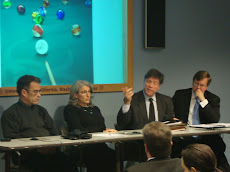"During a public health emergency, state and local officials are authorized to use and appropriate property as necessary for the care, treatment and housing of patients, and to destroy contaminated facilities or materials."Yet a governor can declare an emergency at whim:
"The governor may act to declare a public health emergency without consulting with the public health authority or other experts when the situation calls for prompt and timely action."The Act is full of power grabs that would be triggered by an emergency declaration, such as "suspend[ing] the provisions of any regulatory statute prescribing procedures for conducting state business..." and "The public safety authority may request assistance from the organized militia in enforcing the orders of the public health authority."
But now Gostin is voicing caution, at least about the need to consider the safety of new therapeutic products. Wonder if he has had second thoughts about the danger to our Democracy of his Model Act?
Gostin's comments are in line with official statements by Australia's Health Minister.Dose-sparing strategies to avoid depletion of an already short vaccine supply will increase risks. Studies show that vaccines containing adjuvants cause more adverse effects. More worrying, because the clinical trials are so small, is that adverse effects will not be detected until the vaccine has already been used on a large population. It's essential to conduct rigorous post-marketing surveillance to pick up rare, but serious, effects...
The Rudd government needs to assess carefully the risks and benefits of rapid approval and roll-out of a vaccine. Thus far swine flu has been mild, with most patients making a full recovery. The fear, of course, is that H1N1 will mutate, becoming much more lethal. This was what happened with the second wave of the 1918 Spanish flu, which killed more than 50 million people in a much less populated world. It is a remote possibility, but one that demands watchfulness.
The most prudent course today would be to conduct careful clinical trials with due scientific deliberation; use the vaccine on high-risk groups, phasing in the full population only as evidence of safety and effectiveness becomes clearer; and conducting post-market surveillance for adverse effects.
AUSTRALIANS may have to wait months until a swine flu vaccine is available, federal Health Minister Nicola Roxon said.
Ms Roxon said the government was keen to make a vaccine available as soon as it is safe and effective, but a decision has yet to be made.
"We are happy to take advice that we may not need to wait until the end of the clinical trials but I am not going to be in a position that I will override the release and the mass rollout of the vaccine until we have that advice," she said.
But World Health Organisation flu chief Keiji Fukuda warned of the potential dangers of untested vaccines, saying on Friday: 'One of the things which cannot be compromised is the safety of vaccines.
Despite statements by WHO's director of vaccine research, Marie-Paul Kieny, to the contrary, WHo seems to currently be erring on the side of safety. Agence France Presse carried the following news in mid July:
World Health Organisation chief Margaret Chan cast doubt Wednesday on the government's plans to start vaccinating from next month those most at risk of contracting swine flu.
Chan told the Guardian newspaper that a vaccine would not be available for several months, despite statements from health officials here that the first stocks would start arriving in August.
"There's no vaccine. One should be available soon, in August. But having a vaccine available is not the same as having a vaccine that has proven safe," WHO director general Chan said in an interview with the newspaper. "Clinical trial data will not be available for another two to three months," she said.
At least Australia, in the midst of a severe H1N1 epidemic, and WHO, have kept their wits about them with regard to "quick fix" vaccines that may be more dangerous than the disease they are designed to prevent.
Canada is planning for vaccine in the November-December time frame.










No comments:
Post a Comment